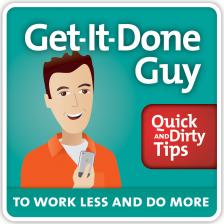Protect Your Work-Life Balance with a Boundary Buddy
If your clients are taking over your life, you need to rethink your approach. Get-It-Done Guy shows how to connect with an accountability partner to keep work from becoming overwhelming.
Twenty-nine-year-old Timmy had a problem.
This dashing young man’s business was too successful. We started working together to help build a business he could run in a few hours a day, so he could follow his dreams of being a tap-dancing pointillist portrait artist at night. To respect his privacy, I won’t say exactly what he does, but let’s pretend his day job is as a creative genius marketing consultant. (He lives in New York, is smart, talented, has leading-man good looks, has watched every episode of Buffy and Angel, and is single, looking for a relationship-oriented woman. If you know any, email getitdone@quickanddirtytips.comcreate new email).
Sponsor: Get more things done with your team: get your free 30-day premium subscription of Wrike now.
At first, Timmy was scraping to get by. But gradually, the quality of his marketing work began to speak for itself. At first, just simple words like “Hmm…” and “Ooh! That’s nice!” But soon enough, the quality began saying things like “Hire this guy, he’s a complete genius!” People listened. Timmy’s client list grew.
Clients Will Push to Have Their Way
The more great work Timmy did, the more people wanted him, and the more they wanted to pay him. The more they paid him, the more they thought they owned him. They would call at 8pm demanding his input on a creative decision. “I’m busy rehearsing my tap routines!” he would declare. “We don’t care. We really need your input on the tagline for our brand of doggie toothpaste, NOW!”
Timmy’s success was making him miserable. It was starting to interfere with his muse, right as he was beginning a chalk triptych featuring the cast of Sesame Street dressed in unique baseball caps. Client demands interfered with his painting. Becoming a modern-day tap-dancing George Seurat doesn’t just happen overnight, you know.
Timmy needed to learn to push back.
Establish Boundaries with Clients Up Front

But that’s because clients simply have expectations that they own you body and soul. Establish boundaries up front and they’ll be easy to enforce later on. When you first meet with a client, discuss how you’ll work together. Timmy now tells new clients, “I don’t work weekends, and if you call outside work hours during a workday, I may not return your call until the following workday morning.”
Inevitably the clients all think, “Of course he’ll make an exception for me!” But now that he’s spoken the boundary out loud, when he does enforce his boundaries, clients aren’t surprised.
Have a Boundary Buddy
Of course, part of Timmy’s problem is that he’s nice. When clients call, they’re genuinely in need. Timmy can’t bear to watch anyone suffer like that, so he starts to say “Sure, I’ll cancel my tap-dance tribute to Shirley Temple Black so I can help with your doggie toothpaste.” As his coach, I can’t allow this.
So I declared myself Timmy’s accountability buddy. Every time he felt his resolve crumbling, he would pick up the phone and call or text.

I would reply, “Do you need your own private island?”
“No.”
“Weren’t you going to spend Saturday starting on a hat? Mapping out a sky? Finishing the hat?”
“Yes.”
“What do you want to tell them?”
“I want to tell them no.”
“You have my permission.”
“Thank you, Get-It-Done Guy!”
This went on for several months. Gradually, Timmy stopped calling. Not because the offers stopped, but because he was getting used to protecting his own boundaries.
Raise Prices
Once he began saying “No,” clients saw him as being super-in-demand, so they wanted him more. His only way to reduce demand was by raising his prices. He has enough clients to fill his work hours and doesn’t want more. Taking on new ones would eat into his voice lesson time (did I mention that he sings? He’s a tenor. He played “Han Solo” in MIT’s production of Star Wars: The Musical.)
Charge more, work less, build a reputation as one of the best in his field, and have time to paint, tap dance, sing, and do backflips. Timmy’s life is what we call “sweet.”
Change Your Actions, Change Your Self

Revolutionize your life. Protect the time you need to pursue the things that are important to you. Set time boundaries in advance, so when you invoke them, people aren’t surprised. Get yourself an accountabilibuddy to help you say “No,” and reconnect with what’s really important to you. (And if you’re a single girl geek in New York, remember: Timmy is currently single.)
For more tips on working less and doing more, check out: get it done guy.
To-do list and other images courtesy of Shutterstock.







